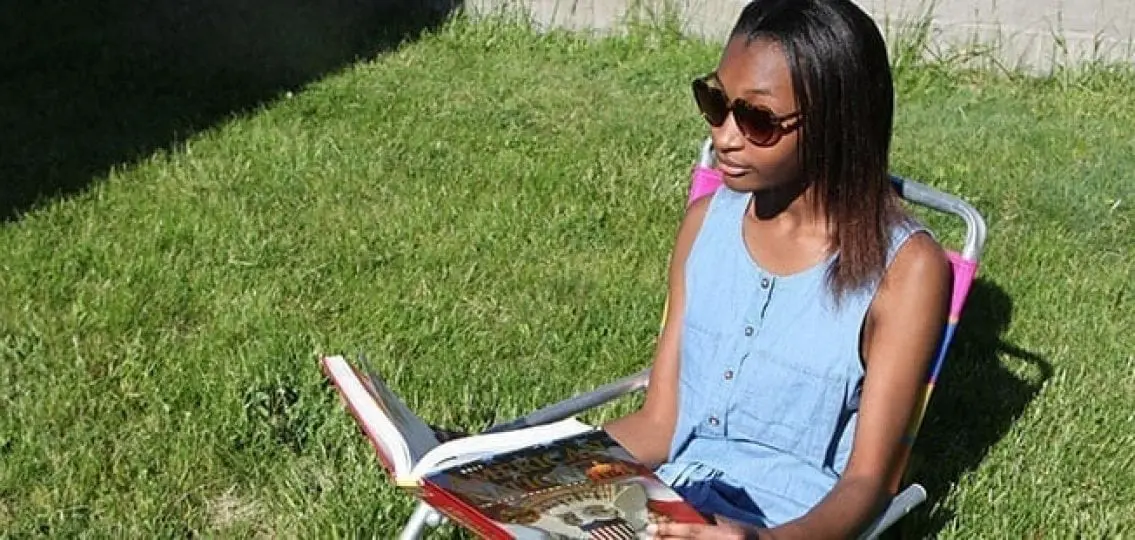When my kids were little, there was no need for me to encourage summer reading. The words “summer reading” were greeted with great enthusiasm. They couldn’t wait to get to the public library to sign up for the summer reading program, putting stickers on their chart for every book they completed and earning fun prizes along the way.


If any of this sounds familiar to you, and you’re wondering how to get your kid’s nose back into a book, you’re not alone. Kathryn Vitek, a language arts teacher at Beachwood Middle School in Ohio, shares her proven strategies to encourage summer reading and lure teens off their screens. She also has some recommendations for books that are sure to please even your most reluctant reader.
How to Encourage Summer Reading
Set the bar a bit lower for summer.
One way to encourage summer reading is to make it relaxing and offer some escape, especially after the challenging year we’ve just had. Says Vitek, “Everyone needs a beach read sometimes. So don’t feel like you need to pressure them into anything too challenging. This is a chance to use their imagination and make connections with characters.”
There is value in re-reading old favorites.
The first step is to encourage summer reading is to get them into a reading mindset, and old favorites can do just that, says Vitek. “Once they’ve passed that challenge, it becomes easier to get into something new. That’s true for adults as well as kids.” So, break out the Harry Potter set or Wimpy Kid series!
Tap into the subjects that interest them most.
Got a kid who loves sports? Vitek recommends Becoming Muhammad Ali by Kwame Alexander. “It’s a quick read written in verse, so it’s also a great choice for reluctant readers.” Your gamer might love Ready Player One and Ready Player Two by Ernest Cline. “My students have been anxiously awaiting this sequel, which was just published this year,” says Vitek. Fantasy lovers might enjoy Anya and the Dragon by Sofiya Pasternack. Those craving action and adventure can check out Alone by Meghan E. Freeman, a survival story that Vitek says “unintentionally connected in a big way after a year of social distancing.” Not sure what will be a hit with your kid? Ask a librarian for recommendations based on their interests.
| [adrotate banner=”216″] |
Get graphic!
Says Vitek, “Graphic novels have a lot more depth than many people credit them with and they are rapidly gaining respect as anchor texts worthy of study. We use them throughout the middle school years.” Some of the most consistently popular are New Kid by Jerry Craft and Dogs of War by Sheila Keenan.
Listen up.
If your summer plans involve a long car ride, try an audio book to make the trip go faster. Vitek’s favorite to recommend, hands down, is Born a Crime read by the author, Trevor Noah. “The audiobook is especially enjoyable because Trevor Noah is multi-lingual. You have the benefit of hearing him switch between languages as he tells his story, which in my opinion makes the experience even more immersive than just reading the text,” says Vitek.
Classics don’t have to be boring.
Teens like survival stories and adventures, and there are plenty to be found in the classics section. “The classic author my students most often tend to choose independently is Jack London (The Call of the Wild and White Fang). And last year my seventh graders got really into Jules Verne and were passing around 20,000 Leagues Under the Sea,” says Vitek. “I think Around the World in Eighty Days, also by Verne, is unexpectedly funny for young readers. My personal favorite is A Little Princess by Francis Hodgson Burnett.”
Give your teacher some homework!
If your teen finds a book they love, they should be sure to tell their teacher about it. Says Vitek, “I spend a good bit of every summer reading the books my students recommend to me. It helps us adjust our curriculum to make sure that when the time for assigned reading comes around, they’ll enjoy that too.”

Of course, there are many benefits to reading, such as increasing language fluency and vocabulary. “Reading also helps our kids to empathize with others by learning about unfamiliar experiences. They learn to be introspective by recognizing parts of themselves in other people and characters,” says Vitek. But the most important factor about encouraging summer reading, she says, is to emphasize quality over quantity. “If you can help them find something they truly enjoy, you’ve hit the mark.”




